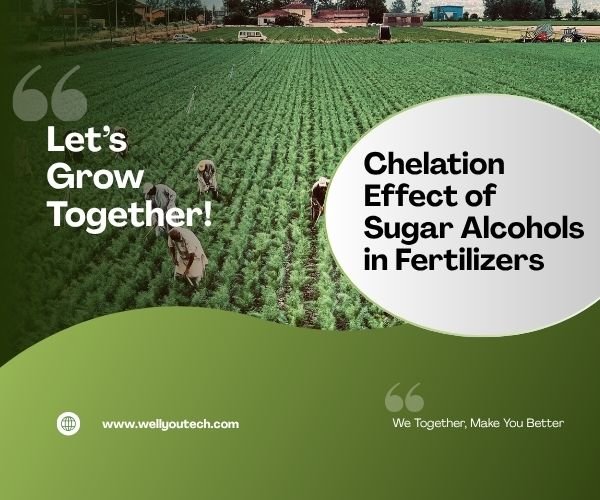In the field of modern plant nutrition, sugar alcohols (polyols) such as mannitol, sorbitol, and xylitol have become valuable natural chelating agents.
They not only stabilize essential nutrients but also improve their transport and absorption within the plant system. As a result, sugar alcohols are increasingly used in high-efficiency fertilizers designed for sustainable agriculture.
1. Formation of Stable Nutrient Complexes
Sugar alcohols contain multiple hydroxyl (-OH) groups capable of coordinating with metal ions like Ca²⁺, Mg²⁺, Zn²⁺, Fe²⁺/Fe³⁺, and B.
Through this chelation, they form stable ring-structured complexes, protecting nutrients from precipitation or fixation in the soil.
This ensures that nutrients remain readily available and mobile, providing plants with a consistent nutrient supply throughout the growth cycle.
2. Promotion of Nutrient Transport of Sugar alcohols
Sugar alcohol-chelated nutrients exhibit excellent phloem mobility.
Elements such as calcium and boron, which are typically immobile in plants, can be efficiently transported from leaves (source tissues) to fruits, roots, and young shoots (sink organs).
This significantly reduces localized deficiency symptoms and supports uniform nutrient distribution, enhancing fruit quality and overall plant vigor.
3. Improved Absorption and Utilization
Thanks to their low molecular weight, good wettability, and high permeability, sugar alcohols increase the adhesion and absorption of fertilizers on both leaf and root surfaces.
Once absorbed, the chelated elements are readily released and utilized because their chemical form closely resembles that of natural plant metabolites.
This reduces the plant’s energy demand for nutrient uptake, leading to higher fertilizer use efficiency and faster growth response.
4. Environmentally Friendly and Safe
Sugar alcohols are natural compounds derived from plant photosynthesis.
Unlike synthetic chelating agents such as EDTA or DTPA, they are biodegradable, non-toxic, and environmentally safe, posing no risk of soil or water accumulation.
Their green origin makes them perfectly aligned with the goals of sustainable and eco-friendly agriculture.
5. Sugar alcohols enhanced Stress Resistance
Beyond their chelating function, sugar alcohols play an important physiological role in plants.
They act as osmoprotectants that regulate osmotic balance, stabilize cellular structures, and scavenge reactive oxygen species (ROS).
When combined with mineral nutrients, sugar alcohol complexes help plants better withstand drought, salinity, and high-temperature stress, leading to improved resilience and yield stability.
6. Outlook and Application Prospects of Sugar alcohols
Sugar alcohol-based chelation represents a next-generation fertilizer technology that merges chemical stability, biological activity, and environmental safety.
It is especially suitable for foliar sprays, liquid formulations, and water-soluble fertilizers, offering high nutrient efficiency and superior crop performance.
As agriculture shifts toward greener, smarter solutions, sugar alcohol chelates stand out as a sustainable choice for enhancing both nutrient efficiency and plant health.
Sugar alcohol chelation improves nutrient stability, transport, absorption, and stress resistance, making it a key innovation in modern fertilizer development.
With its natural origin and environmental compatibility, this technology reflects Wellyou Tech’s commitment to high-efficiency, sustainable agrochemical solutions for global agriculture.


